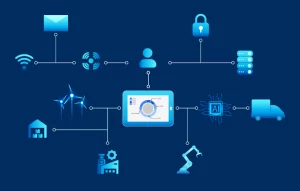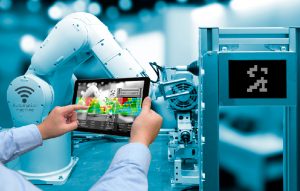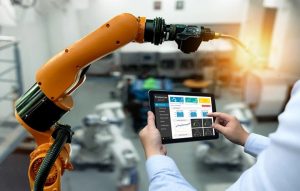Hey everyone, I am Suyash Deo, Functional SME for IoT and Advanced data practices at Softweb Solutions, an Avnet company.
I welcome you all to a brand-new podcast episode today where I will be speaking on how the COVID-19 pandemic is forcing companies to go digital and contributing to the Industry 4.0 revolution. I will also tell you how manufacturing companies are utilizing digital transformation during this time to turn their factories into smart factories and getting ready for the new normal.
Before starting the episode, let us look at the current scenario of the world and how the pandemic is forcing the global business ecosystem to move towards digitization across industries.
- How COVID-19 pushes a digital transformation boom across the world?
- The current scenario of the world, the challenges and how to mitigate them with technology.
- How IoT technology can fast-track certain digital transformation objectives of businesses?
- Different ways in which, IoT can help bring the digital transformation and how to get started.
- The rise in adoption of Industry 4.0 is reflecting a greater trend of automation.
- What will be the post-pandemic businesses look like?
Currently, the global economy is in the severe slowdown mode amid the upsetting developmental targets of economies across the world. The disruption caused by the pandemic left nothing untouched and will change the way we have lived and worked. With social distancing as a new norm, the way businesses operate and people connect has changed to remote workforces, seamless digital experiences and new social norms.
Life of individuals and the way of working is no longer the same now. The evolving situation has challenged us to accelerate the digital transformation to adapt quickly to an unprecedented new model. We are seeing technology and organizations come together for the greater good, be it, enabling the remote workforce to stay connected with advanced collaboration tools. Disruptions may appear suddenly but having a future-proof digital transformation strategy can help companies remain agile and resilient while accelerating future growth.
- With no digital strategy, industries are struggling to strive
- Real-time communication and collaboration are pressing issues
- Productivity & teamwork among remote teams is a distant dream
- Scalability of systems
- Lack of advanced technologies
- Less resilient to the crisis
COVID-19 – A call to accelerate digital transformation
- In the past few weeks, the world has changed — impacting priorities on a personal and business level.
- Due to the pandemic, more than 70% of companies have already undergone a digital transformation to date.
- Since the beginning of the year 2020, the world has experienced more digital transformation than ever before with the unfolding of COVID-19, cutting five-year roadmap to a couple of years.
- Every sector including, telecom, healthcare and pharmaceuticals along with manufacturing are going digital today.
- The corporate world has also gone remote, adapting digital technologies, IoT, cloud, etc.
- Businesses and enterprises across industries will have to embrace a new remote environment to come out stronger on the other side of the crisis as firms that will not transform digitally, will remain paralyzed.
- Digital transformation is no longer a ‘nice to have’ thing or an additional element but it is now a ‘must-have’ thing rather a primary element for businesses and enterprises worldwide.
- But underlying questions are how to transform digitally, what are the challenges involved and which are ideal technologies to transform your enterprise digitally.
Digitalize for survival and new business breakthroughs
- It is obvious to have the right digital tools and technologies surrounding the lockdowns and social distancing during such crises.
- Businesses must turn this crisis into opportunity and utilize this time to speed up the digital transition.
The six tenants of digital strategy to be considered for a complete transformation are:
1. Remote collaboration tools
2. Hybrid cloud strategy
3. Agile contingency plan
4. Dark factory i.e. Industry 4.0
5. Data infrastructure as a strategic asset
6. Information security
COVID-19 is driving businesses to revisit digital transformation
- Digitization is not only transforming the way corporate firms work but also radically changing the face of manufacturing companies.
- Before we got hit by the pandemic, the Industry 4.0 revolution has already taught us to live in the virtual world with autonomous machines.
- The manufacturers all around the world are currently addressing challenges in the face of the pandemic that require to embrace new-age digital technologies while continuing to build resiliency for the future.
- Digital transformation tools and technologies offer companies the ability to monitor real-time production and the other operations of the plants.
- Increased customer engagement
- Improved partner relationships
- Improved data quality to create a 360-degree customer view
- Increased marketing budget efficiency
- Smart manufacturing and IoT is driving the next industrial revolution.
- In this highly competitive market, IoT-enabled smart manufacturing provides full visibility of assets, processes, resources, and products.
- In addition to the IoT, other digital technologies like Artificial Intelligence (AI), machine learning, and Augmented Reality (AR) are greatly adopted by manufacturing firms and post-pandemic, these technologies will become the mainstream.
- However, it is critical that chosen digital technologies have built-in flexibility and advanced cloud solutions in place to curb the current crisis today, and beyond.
- Industry 4.0 and the current pandemic together are changing the manufacturers’ journey, with digital transformation now forming the foundation of smart factories driven by intelligence on demand.
- As per McKinsey, companies that have embraced these technologies early are already seeing a 7% revenue growth advantage over their peers.
- IoT enables, drives and accelerates digital transformation as the sheer number of connected devices forms a hyper-connected world, leveraging connected knowledge on a greater scale.
- The digital transformation is driving businesses to embrace IoT technology to cut through this crisis with:
- Virtual work is not just for the office anymore; it is a new reality that will fundamentally change the work environment in manufacturing and help accelerate a trend towards lights-out facilities.
- The virtual shift will help digitize and scale much-needed expertise across the organization and enable the onsite workforce to become more focused, effective, and ultimately significantly more productive.
- Automation has always been a part of the factory to some degree, and even high levels of automation are nothing new. But today, factories are going beyond simple automation with smart factories.
- Within the smart factory, manufacturers can enact processes such as the digital twin, enabling them to digitize an operation and move beyond automation and integration into predictive capabilities.
- While automation and controls have existed for decades, the fully smart factory has only recently gained traction due to the emergence of the global outbreak of the virus.
- Deployment of Industrial IoT, including sensing, data availability, remote collaboration tools and AI-based insights.
- Build up strategic resilience in the aftermath of the current crisis.
- When the crisis eases, we will have entered a new digital normal.
- Connected everything – Technology will be deployed across every part of every business.
- There has been a rapid spread of “smart devices”. In the new normal, as a result of social distancing norms, there will be a larger growth in such devices.
- The business of the future will transform working habits – remote working and use of managed office spaces will predominate as enterprises seek flexibility with which to manage sudden change.
For manufacturers, driving the digital transformation is equally important as improving dealer and customer experiences, including:
With the rise of the fourth industrial revolution, Industry 4.0 and the convergence of the digital and physical worlds emerges smart factories. The manufacturing sector is being fundamentally reshaped by the unstoppable progress of the 4th Industrial Revolution, powered by the IoT. A smart factory integrates data from system-wide physical, operational, and human assets to drive manufacturing, maintenance, inventory tracking, digitization of operations through the technology like digital twin.
SUBSCRIBE TO OUR PODCAST
The rise in the demand of advanced technologies like IoT
At the center of industrial transformation is IoT, which is responsible for the rise of smart machinery. Embracing digital technologies like IoT, AI, cloud, etc. will be fundamental in realigning businesses in the post-COVID-19 era.
1. Increased automation
2. Connected things
3. Data monetization
4. Cloud computing
5. Advanced analytics
6. And better workforce equipped with AR/VR applications
The rise of remote work and the automation in the manufacturing segment
With social distancing measures in place, manufacturers may lose up to 50% of their on-site personnel. As manufacturers face this dilemma, we will see the rapid adoption of remote diagnostic, management and collaboration tools. This will result in the emergence of a “virtual shift”: a team of specialists connected remotely and constantly online.
How to get started with digital transformation?
Many companies have a digital transformation initiative in its place, but a true digital transformation always starts with a strategic goal and the right tools and technologies. When starting your digital transformation, developing a digital culture is very crucial that defines your way and strategy towards transformation journey. It is also significant to consider that digital culture cannot thrive if your company runs in silos with disconnected or under-connected business functions.
How will the business world look like in the new normal?
Talking about the manufacturing industry, the current crisis will lead manufacturers to diversify their “just-in-time” manufacturing operations. Of course, as every business process becomes ever more digitized, the sheer quantity of data being created will grow exponentially. These terms will become quite normal in the world of digital business: Remote collaboration, Virtual culture, Cloud-first approach, Mobile-first, Data-driven and so on.
Right now, you should be seeing your business environment during COVID-19 as a benchmark to find out how well you are meeting the expectations of your customers to employees. So, the million-dollar question is, are you in a good position or do you need to work a lot on your business transformation?
Thank you everyone for your time and attention, please keep safe. Keep visiting our site. And don’t forget to join us for the next podcast.









